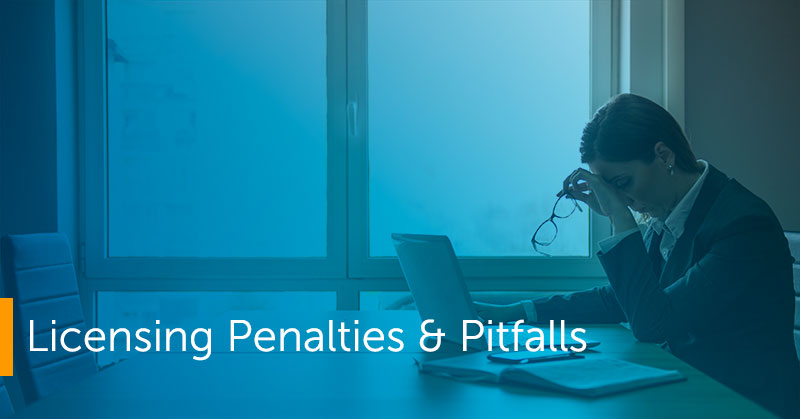-
Software
Compliance Software
Oversee licenses, track renewals, access documents, and more from a single interface.
Software Overview -
Services
Compliance Services
Full service compliance solutions for organizations throughout their entire lifecycles.
Services Overview -
Industries
-
Partner
- Information Center
Managing Business Licenses to Avoid Costly Errors
Posted on September 28, 2017 by Betsy Gonzalez in Business Compliance.

Most businesses deal with licensing and registration requirements on an as-needed basis, with staff in the legal or operations departments managing their required filings through software such as Excel. As a result, employees are often in the difficult position of trying to stay on top of a complex cycle of reporting requirements and tasks with inadequate guidance and support.
Whether you’re managing licensing for a small professional firm or a national organization, the task is time consuming and complex. Small businesses frequently overlook requirements because of a lack of time and expertise, while large and growing companies often suffer from licensing gaps because they are in multiple jurisdictions with a vast web of regulations to track and respond to. Because the licenses themselves are relatively inexpensive, costing from tens to hundreds of dollars in each jurisdiction, they can be somewhat forgettable. And that’s precisely where businesses run into trouble.
Another reason why businesses sometimes develop licensing gaps is that licenses take time to acquire. In some jurisdictions, approval takes a minimum of eight weeks after the completed application is submitted, even when the application is perfect. In challenging jurisdictions, it can take months for an employee without licensing expertise to navigate the administrative requirements and acquire a license. When businesses fail to include licensing in their operational strategy, they frequently wind up in the position of having to delay their plans or risk operating without a license while their applications are processed. Often, businesses will do the latter, gambling that the benefits will outweigh the risks and figuring they can “catch up” later.
Unfortunately, once an oversight occurs, that relatively minor license fee can snowball into an avalanche of unwelcome expense. Following is a breakdown of some of the expenses that can result from a licensing gap.
Missed Opportunities
In many instances, companies must be licensed before they can perform or even advertise their services within a state or jurisdiction, and these requirements are actively enforced. The Virginia Board of Accountancy recently fined an accountant for using the CPA designation on his LinkedIn profile without an active license. In June 2017, a Washington man was cited for emailing opinions about traffic light timing to Oregon state officials because he was not licensed to practice engineering in the state.
Unfortunately, many businesses only turn to the question of licensing after they identify a new opportunity that they want to pursue. By then, it is often too late. Managing licensing strategically can help businesses avoid the very frustrating (and all-too-common) experience of missing out on a 5-figure contract for lack of a $500 license.
Penalties and Fines
The penalties for a lapsed or missing license far outweigh the costs of proactive licensing. For example:
- An engineer who practiced in Texas without a license was recently assessed $3,900 in penalties. The license itself costs $80.
- A Pennsylvania funeral home was fined $10,000 for operating with expired licenses. A license costs $35.
- In August 2017 alone, the Oregon Construction Contractors Board issued more than 60 penalties totaling over $146,500 to contractors for advertising, bidding, or performing work without a license. The fee for a 2-year license is $325.
- A human resources startup was fined more than $7 million by the state of California in November 2016 for allowing employees to transact insurance without a license. An insurance agent license costs $170.
In addition, many states have “no license, no recovery” laws stipulating that contractors who operate without a current license forfeit their right to payment for their services, even if the work is done perfectly.
Added Costs of Disciplinary Actions
Fees for reinstating a lapsed or revoked license are much higher than the costs of keeping licenses current. In addition, businesses must report disciplinary actions to other jurisdictions where they have licenses, sometimes in perpetuity, and company executives may be required to appear before licensing boards for disciplinary hearings. All of these requirements compound the costs and the administrative burden on the business.
Criminal Charges
In many cases, failing to have the proper license in place before operating in a jurisdiction carries criminal penalties ranging from misdemeanor to felony charges. Sanctions also frequently include license revocation. In many cases, legal representation is required.
Reputation Damage
All of these disciplinary actions are a matter of public record, readily available online to anyone who researches your business. The resulting damage to your company’s reputation and competitive position may erode your ability to capture future business for years to come.
That’s a steep penalty to pay for overlooking a license renewal.
The Alternative: Strategic Compliance
The good news is that licensing gaps are totally avoidable. In fact, with proactive, strategic management, business licensing can give your company a competitive edge. Being fully compliant says something about your professional standards and your company’s viability, and allows you to aggressively grow whenever and wherever the next opportunity takes you.
Many of our clients come to us with one request: Take care of this so we never have to think about it again. And given some of the licensing experiences they’ve had, we understand. But we like to think we help businesses move beyond negative experiences to see compliance the way we do: in terms of peace of mind, competitive agility, and good standing.
Want to be in a better place when it comes to business licensing? Whether you want to turn it all over and forget it, or just give your internal staff the tools and support to get the job done, we’re happy to help.



